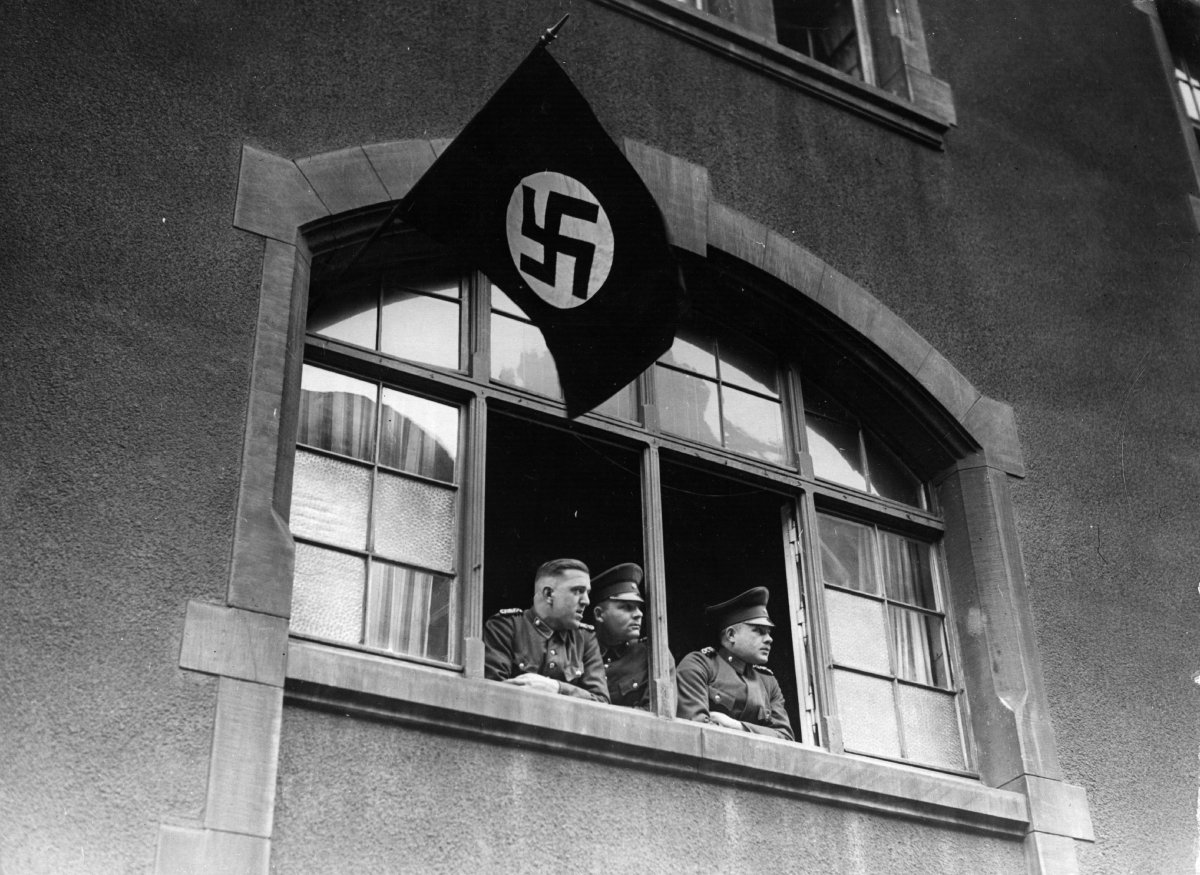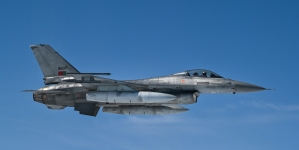-
Nazism Will Remain a Weapon in the Information War - March 28, 2024
-
A portion of Mulholland Drive, damaged by mudslides in winter storms, reopens - May 26, 2024
-
‘Maybe You Don’t Want to Win’ - May 26, 2024
-
Donald Trump Putting Law Enforcement in Danger: Attorney - May 26, 2024
-
Avoid the waters of these 5 L.A. County beaches this holiday weekend, public health officials say - May 26, 2024
-
Bawdy Comedy ‘Anora’ Wins Palme d’Or at Cannes Film Festival - May 26, 2024
-
Map Shows Heat Wave Zone Spread Into Five New States - May 26, 2024
-
Azusa police arrest suspected slingshot-wielding vandal - May 25, 2024
-
Donald Trump Hammers Judge Ahead of Jury Instructions - May 25, 2024
-
Sometimes U.S. and U.K. Politics Seem in Lock Step. Not This Year. - May 25, 2024
Nazism Will Remain a Weapon in the Information War
On Feb. 17—waving swastika banners, shouting “Sieg heil!” and making Hitler salutes—members of the self-declared Nazi group Blood Tribe marched on the streets of Nashville, Tenn. The gathering led to heavy condemnation, domestically and internationally.
One of these responses came from Maria Zakharova, spokesperson of the Russian Foreign Ministry. “The U.S. concept of freedom applies exclusively to the ‘forces of evil’ and effectively boils down to unleashing everything that is ‘taboo,'” she said. Zakharova went on to accuse the U.S. of “whitewashing” Nazis.
Few modern phenomena are as closely linked to taboos as Nazism, the ideology underpinning Germany’s Third Reich. After 1945, Nazism has been widely conceived as a force of absolute or radical evil—especially due to its association with industrial genocide in the form of the Holocaust. Nazism is a potent, and naturally also popular, invective in political debates—and the charge of Nazism has even been weaponized in the information war that is currently being waged on the international arena between the United States and Russia.
For Russia, today’s fight against what is perceived as Nazism harks back to the country’s victorious resistance against Nazi Germany—or “the Great Patriotic War,” as it is fondly remembered. From 2005 up till the present, Russia has put forward a yearly U.N. resolution named “Combating the glorification of Nazism.” The resolution is each time, last time in December 2023, passed with a solid majority of votes.
The U.S. condemned the resolution as a “shameful political ploy” in November 2023.
“The Russian Federation’s resolution is not a serious effort to combat Nazism, antisemitism, racism, or xenophobia—all of which are abhorrent and unacceptable. Instead, Russia’s attempts to instrumentalize history to justify its aggression is an affront to Holocaust victims and to all who fought against Nazism,” the U.S. said in a statement. From the American perspective, then, the resolution is nothing but a cynical propaganda tool, and a desecration of the memory of the victims of the Holocaust and of Nazism.
A recent report from the Global Engagement Center, a subsidiary of the U.S. State Department, asserted: “Mimicking disinformation tactics of the past, Putin’s Kremlin repeats cynical lies, manipulating the history of the Holocaust and the Second World War, obscenely exploiting the suffering and sacrifice of all those who lived through the Shoah and World War Two, and falsely accusing Jews, and supporters of Ukraine in general, of neo-Nazism.” Again, we meet the accusation of instrumentalization of the Nazi genocide for political gain.
The U.S. recently accused the Kremlin of disseminating false narratives, minimizing the role of antisemitism in Nazi ideology. The report further said that the Kremlin promulgates false pretexts for Russia’s war against Ukraine, such as the need for the latter’s “denazification,” spreads antisemitic conspiracy theories, operates antisemitic websites, and uses neo-Nazi groups.
A 2022 joint statement from Western countries, co-signed by the Special Envoy for Holocaust Issues subordinated to the U.S. State Department, echoed a similar sentiment by the Global Engagement Center.

Keystone/Getty Images
“We can never let the memories of those victims and all who were murdered in the Holocaust be dishonored, erased, or cynically misused for political purposes. … It is particularly horrifying that Vladimir Putin is trying to justify his unprovoked war against Ukraine by distorting and misappropriating Holocaust history,” the statement said.
On the first day of Russia’s 2022 invasion of Ukraine, President Vladimir Putin justified the war through an appeal to the historical legacy of the self-sacrificial protection of “Mother Russia” against the onslaught of Nazism. And from Russia’s point of view, the U.S. and its allies, through their military backing of Ukraine, are now facilitating the resurgence of Nazism.
“The outcomes of World War II and the sacrifices our people had to make to defeat Nazism are sacred,” Putin said. “Comrade officers, your fathers, grandfathers and great-grandfathers did not fight the Nazi occupiers and did not defend our common Motherland to allow today’s neo-Nazis to seize power in Ukraine.”
Concerning the recent demolition of Soviet-era monuments in some Baltic countries, the Kremlin’s spokesperson Dmitry Peskov accused the Estonian prime minister of “desecration of historical memory.” Zakharova also stated, “Crimes against the memory of the world’s liberators from Nazism and fascism must be prosecuted.”
Both Russian and U.S. official rhetoric make appeals to the memory of the fight and fighters against Nazism—and to the desecration of this very memory. Some taboo has been violated in the eyes of both “combatants” in this information war between Russia and the United States.
While Russia defends its current “special military operation” as necessary to eradicate Nazism in Ukraine, the U.S. accuses Russia of committing an act of military aggression akin to that of Nazi Germany unleashing the last world war.
The U.S. “supports the development of an internationalized tribunal dedicated to prosecuting the crime of aggression against Ukraine.” Such a tribunal would be modelled on the International Military Tribunal in Nuremberg, which in 1945-1946, affirmed that the “crime of aggression” is the “supreme international crime” as it “contains within itself the accumulated evil of the whole.”
Despite escalating tensions between the U.S. and Russia, both countries agree on one thing: Nazism is something that must be condemned and combated. Which aspects of the ideology are being accentuated, and which methods are chosen to combat it, reveal certain differences between the two parties. But a basic “anti-Nazi” orientation is proclaimed by both the U.S. and Russia.
The shared sense of the moral aura of Nazism—its linkage to a sort of mythic or transhistorical evil—has important implications for the shaping of political communication on both sides of this conflict. As an accusation—whether relating to glorification, rehabilitation, or facilitation of this political phenomenon, or to some kind of insensitive handling of its history—Nazism is an invaluable item in the rhetorical arsenal of both the U.S. and Russia.
Nazism will remain a powerful weapon in the information war raging on the global stage for years to come.
Carl Müller Frøland is a historian and author of the book, Understanding Nazi Ideology: The Genesis and Impact of a Political Faith (BookLocker, 2024). He is working on a PhD on Nazism as a worldview.
The views expressed in this article are the writer’s own.
Uncommon Knowledge
Newsweek is committed to challenging conventional wisdom and finding connections in the search for common ground.
Newsweek is committed to challenging conventional wisdom and finding connections in the search for common ground.
Source link































